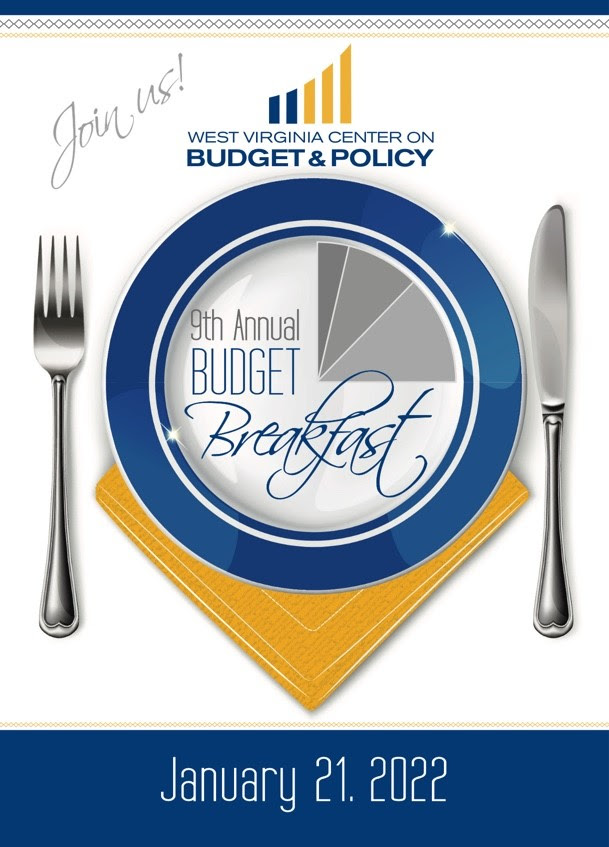The WVCBP is a proud member of the West Virginia Criminal Law Reform Coalition, a group of West Virginia-based organizations partnering in pursuit of systemic changes to the state’s criminal legal system.
This past Monday, the coalition hosted an advocacy day at the Capitol to bring awareness to the issues members hope to see addressed during the 2022 legislative session.
The event featured a meet-and-greet breakfast with legislators, meetings between participants and their representatives, and a press conference highlighting the coalition’s policy priorities. The coalition was encouraged by our communications with state legislators and will work diligently throughout the upcoming 2022 legislative session to make meaningful strides toward much-needed criminal legal reform in West Virginia.
You can watch the full press conference here and read an article reporting on the event here.

Join us for our 9th annual Budget Breakfast!
Each year, the WVCBP holds this event to provide analysis of the Governor’s proposed budget. You’ll hear from our executive director, Kelly Allen, our senior policy analyst, Sean O’Leary, and our chosen keynote speaker, Brian Elderbroom of Justice Reform Strategies.
Please find further event details below. You can purchase a ticket for the event here.
WHAT: WVCBP’s 9th Annual Budget Breakfast
WHEN: January 21, 2022. Breakfast will be available starting at 7:30am. The WVCBP’s analysis of the Governor’s 2023 proposed budget will begin at 8am, followed by keynote speaker presentation and time for Q&A.
WHERE: Charleston Marriott Town Center (200 Lee Street East, Charleston, WV 25301)
WHO:
PLEASE NOTE: The cost of a single standard ticket is $50, but if you take advantage of our Early Bird Special (available to all who register by 12/31/21), you will receive $10 off.
We appreciate your support of the WVCBP and our work, and we hope to see you in January!

| Congress is currently in the process of negotiating the Build Back Better recovery agenda, and the future of the enhanced Child Tax Credit remains uncertain. In a recent op-ed, Reverend Alton Dillard wrote about why the extension of the enhanced credit is critical for families in the Mountain State. Excerpt below: The expanded federal Child Tax Credit has been especially beneficial to our state. This temporary expansion was part of the American Rescue Plan passed by Congress earlier this year as the latest effort to help the nation get through the pandemic. But this enhanced credit should continue given how important it has been in reducing child poverty already. My job involves working with teenagers from the age of 15 to 18. In talking with them, I have learned that some of them have gone hungry. The expanded Child Tax Credit provides direct monthly payments to many parents to make sure the needs of their children are being met. It is doing that. For example, within the first month that the payments were made available, the number of households with children that reported not having enough food dropped significantly. Not having enough food is just one of the hurdles that face many low-income West Virginians. Finding the resources to make it week to week can be challenging. The expanded Child Tax Credit has made a difference by helping families pay for other necessities beyond food, including clothing, school supplies, and utilities. It has also helped to lighten their debt load and has helped by providing money for child care. The expanded Child Tax Credit is one way we can help our children and is a concrete way of letting them know that someone cares for them – that we, as a state and nation, care for them. Both Senator Capito and Senator Manchin have been champions for children in our state. Overall, 93 percent of children in West Virginia will benefit from this credit expansion, which includes strong safeguards against fraud. I encourage Congress to support this legislation that will help strengthen our children, and not only our children, but our families, our state, and our nation. Read the full op-ed here. |

Recently, the Bureau of Labor Statistics reported that the overall year-over-year inflation rate in October was 6.2 percent, a notably high rate. While there are many reasons to believe that inflation will ease in the coming months, some, including West Virginia Senator Joe Manchin, are arguing that current high rates of inflation are not transitory and instead are the result of too much economic stimulus, fueling arguments to further cut the provisions of the Build Back Better agenda. However, while stubbornly high, current inflation is still largely related to COVID-19’s disruptions to the economy, and scaling back the provisions of the Build Back Better agenda would not only fail to help address this inflation, but could potentially make it even more painful for West Virginians.
Rather than too much stimulus causing too much demand, recent inflation has been a result of a sharp reallocation in spending in response to the pandemic. During the recovery, households cut back spending on face-to-face services (e.g., at restaurants, hotels, and gyms) and significantly increased spending on goods (such as clothing, furniture, and automobiles). This rapid increase in demand for goods instead of services has exacerbated supply-chain disruptions that were initiated by COVID-19. Global production shut down during the pandemic, and as production came back, volumes were much higher than before to meet the backlog, creating supply chain issues throughout the economy. And this has in turn led to further production issues.
With that being said, the current inflation spike provides no reason to cut back on the Build Back Better agenda. First, while the American Rescue Plan Act was largely front-loaded with fiscal stimulus to provide an immediate response to the pandemic recession, theBuild Back Better agenda is a long-term investmentin the U.S. economy. It is also largely paid for and financed by tax increases on the wealthy, which would blunt any inflationary impact. In fact, the investments in the Build Back Better agenda are actually expected to boost the productive capacity of the U.S. economy and ease inflationary pressure in the future.
Learn more in Sean’s full blog post.

The WVCBP’s Elevating the Medicaid Enrollment Experience (EMEE) Voices Project seeks to collect stories from West Virginians who have struggled to access Medicaid across the state. Being conducted in partnership with West Virginians for Affordable Health Care, EMEE Voices will gather insight to inform which Medicaid barriers are most pertinent to West Virginians, specifically people of color.
Do you have a Medicaid experience to share? We’d appreciate your insight. Just fill out the contact form on this webpage and we’ll reach out to you soon. We look forward to learning from you!
You can watch WVCBP’s health policy analyst Rhonda Rogombé and West Virginians for Affordable Health Care’s Mariah Plante further break down the project and its goals in this FB Live.

Earlier this year, our federal policymakers sent money to families so people can pay their rent and put food on the table, helped school districts protect teachers’ health and get kids back into the classroom, and boosted vaccine distribution—all of which will help accelerate our economy and address the immediate health and economic impacts of the pandemic.
Congress acted because we raised our voices together and demanded help. With short-term relief on the way, now Senator Manchin and Senator Capito need to look to our future and pass economic recovery legislation that ensures everyone can thrive, no matter what we look like or where we come from.
Our elected officials are negotiating recovery legislation now, so it’s time to make yourself heard again. Tell them you want our government to support working families and invest in our economic recovery by making health care coverage more available and affordable, permanently expanding relief for struggling people, and ensuring children get the support they need to succeed.
Please join us in urging Senators Manchin and Capito to support the Build Back Better Agenda by sending them a letter here.
